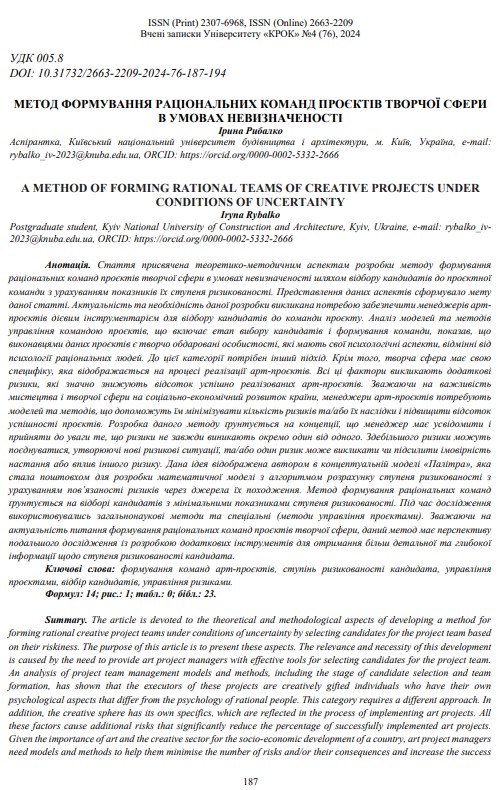МЕТОД ФОРМУВАННЯ РАЦІОНАЛЬНИХ КОМАНД ПРОЄКТІВ ТВОРЧОЇ СФЕРИ В УМОВАХ НЕВИЗНАЧЕНОСТІ
DOI:
https://doi.org/10.31732/2663-2209-2024-76-187-194Ключові слова:
формування команд арт-проєктів, ступінь ризикованості кандидата, управління проєктами, відбір кандидатів, управління ризикамиАнотація
Анотація. Стаття присвячена теоретико-методичним аспектам розробки методу формування раціональних команд проєктів творчої сфери в умовах невизначеності шляхом відбору кандидатів до проєктної команди з урахуванням показників їх ступеня ризикованості. Актуальність та необхідність даної розробки викликана потребою забезпечити менеджерів арт-проєктів дієвим інструментарієм для відбору кандидатів до команди проєкту. Аналіз моделей та методів управління командою проєктів, що включає етап вибору кандидатів і формування команди, показав, що виконавцями даних проєктів є творчо обдаровані особистості, які мають свої психологічні аспекти, відмінні від психології раціональних людей. До цієї категорії потрібен інший підхід. Крім того, творча сфера має свою специфіку, яка відображається на процесі реалізації арт-проєктів. Всі ці фактори викликають додаткові ризики, які значно знижують відсоток успішно реалізованих арт-проєктів. Зважаючи на важливість мистецтва і творчої сфери на соціально-економічний розвиток країни, менеджери арт-проєктів потребують моделей та методів, що допоможуть їм мінімізувати кількість ризиків та/або їх наслідки і підвищити відсоток успішності проєктів. Розробка даного методу ґрунтується на концепції, що менеджер має усвідомити і прийняти до уваги те, що ризики не завжди виникають окремо один від одного. Здебільшого ризики можуть поєднуватися, утворюючі нові ризикові ситуації, та/або один ризик може викликати чи підсилити імовірність настання або вплив іншого ризику. Дана ідея відображена автором в концептуальній моделі «Палітра», яка стала поштовхом для розробки математичної моделі з алгоритмом розрахунку ступеня ризикованості з урахуванням пов’язаності ризиків через джерела їх походження. Метод формування раціональних команд ґрунтується на відборі кандидатів з мінімальними показниками ступеня ризикованості.
Завантаження
Посилання
Rybalko I.V., Alkema V.G. Modern approaches to managing a project team in the creative sphere. Professional management in modern conditions of market development : materials of reports of the VIII scientific and practical conference with international participation, Kharkiv, November 1, 2019 : Monograph, 2019. Р. 230-232.
Rybalko I.V., Chaiun N.S., Bielova O.I. Psychological aspects of a creative personality and their influence on the implementation of an art project. Management of the development of complex systems: a collection of scientific papers. Kyiv : KNUBA, 2020. № 44. С. 34-42. DOI: https://doi.org/10.32347/2412-9933.2020.44.34-41.
Rybalko I.V. Managing art project teams in conditions of high instability. Genesis of management: systems, processes, projects : a collective monograph: in 2 volumes. Vol. 2 / edited by V.G. Alkema. Kyiv: KROK University, 2024. Р. 138-163. https://dspace.krok.edu.ua/handle/krok/3135.
Rybalko I.V. Analysis of the influence of psychological characteristics of stakeholders on art projects. Project management: state and prospects : materials of the XVI international scientific and practical conference, Mykolaiv, 8-11 September 2020. Р. 91-95.
Dotsenko N.V., Sabadosh L.Y., Chumachenko I.V.. Methods of human resource management in the formation of teams of multi-projects and programmes: a monograph. Kharkiv : KhNUIA named after A.M. Beketov, 2015. Р. 201. ISBN 978-966-695-357-8.
Vaisman, V.O., Kolesnikova, K.V., Natalchyshyn, V.V. Modern concept of project-oriented team management of the enterprise. Modern technologies in mechanical engineering : a collection of scientific papers of NTU ‘KhPI’. Kharkiv, 2013. Issue 8. Р. 246-253.
Olenich, A.V., Shatska, Z.Y. Formation and development of the project team in modern conditions. Economics and management of enterprises. 2012. № 10. Р. 136-142.
Danchenko, O.B., Kuzminska, Y.M. Creative potential of the team as a factor of project success. Project management and production development : a collection of scientific papers of SNU. Luhansk : V. Dahl SNU Publishing House, 2012. № 3 (43). Р. 70-74. URL: http://nbuv.gov.ua/UJRN/Uprv_2012_3_12.
Kuzminska, Y. M. Features of managing a team of educational projects. East-European Journal of Advanced Technologies : a collection of scientific papers. 2012. № 1/11 (55). Р. 62-64. DOI: 10.15587/1729-4061.2012.3608.
Maslennikova, K.S., Kolesnikova, K.V. Components of behavioural competence of a project team member on the basis of a competence-based approach. Management of the development of complex systems : a collection of scientific papers. Kyiv: KNUBA, 2013. Issue 14. Р. 48-51.
Verenych O. V. Development and implementation of a formalised model of the mental space of the project or programme environment. East European Journal of Advanced Technologies. 2016. т. 2. № 3 (80). Р. 21-31.
Danchenko O.B., Bedrii D.I., Semko I.B. Identification of personnel risks of scientific projects. Project management and production development: a collection of scientific papers. Luhansk: Volodymyr Dahl East Ukrainian National University (Sievierodonetsk), 2017. № 4(64). P. 18-24.
Teslia, I., Yehorchenkova, N., Yehorchenkov, O., Khlevna, I., Kataieva, Y., Veretelnyk, V., Chastokolenko, I., Ohirko, I., Khlevnyi, A., Latysheva, T. (2022). Development of the concept of construction of the project management information standard on the basis of the primadoc information management system. Eastern-European Journal of Enterprise Technologies, 1 (3 (115)), 53-65. doi: https://doi.org/10.15587/1729-4061.2022.253299.
Meredith Belbin, R. (2011). Management teams: Why they succeed or fail. Human Resource Management International Digest, 19(3).
Hersey, P. and Blanchard, K.H. (1969) Management of Organizational Behavior: Utilizing Human Resources. Prentice Hall, New Jersey.
Tuckman, B. W. (1965). Developmental sequences in small groups. Psychological Bulletin, 63, 384–399.
Tuckman, B. W. & Jensen, M. C. (1977). Stages of small group development revisited. Group and Organizational Studies, 2, 419–427.
Beckhard, R. (1972). Optimizing team building efforts. Journal of Contemporary Business, 1(3), 23–32.
R. D. P. Suhanda and D. Pratami, RACI Matrix Design for Managing Stakeholders in Project Case Study of PT. XYZ. International Journal of Innovation in Enterprise System, vol. 5, no. 02, pp. 122–133, Jul. 2021, doi: 10.25124/ijies.v5i02.134.
Bas D. V. Art projects, their features and definitions. Bulletin of Cherkasy State Technological University. Series: Technical sciences. Cherkasy : CHSTU. 2016, № 3. Р. 57-62.
Rybalko I.V, Haruta V.S. Conceptual model of art project team management. Project management: state and prospects : materials of the XVII International scientific and practical conference, Mykolaiv, 7-10 September 2021. Р. 69-71.
Dictionary of the Ukrainian language. Dictionary. Portal of the Ukrainian language and culture : website. URL: https://slovnyk.ua/index.php?swrd=%D1%80%D0%B0%D1%86%D1%96%D0%BE%D0%BD%D0%B0%D0%BB%D1%8C%D0%BD%D0%B8%D0%B9.
Rybalko I. V. Mathematical model of behavioural risk management of art projects. Bulletin of the National Technical University ‘KhPI’. Series: Strategic management, portfolio, programme and project management. Kharkiv: NTU ‘KHPI’, 2022. № 1 (5). Р. 56-61. DOI:10.20998/2413-3000.2022.5.7.

Downloads
Опубліковано
Як цитувати
Номер
Розділ
Ліцензія

Ця робота ліцензується відповідно до Creative Commons Attribution-NonCommercial 4.0 International License.

